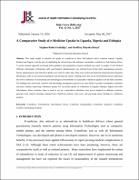A comparative study of e-medicine uptake in Uganda, Nigeria and Ethiopia

View/
Date
2017-05-06Author
Isabalija, Stephen Robert
Mayoka Kituyi, Geoffrey
Metadata
Show full item recordAbstract
This study sought to examine the uptake of e-medicine in three Sub-Saharan Africa countries namely; Uganda, Ethiopia and Nigeria, with the aim of establishing the salient factors that influence sustainable e-medicine in Sub-Saharan Africa. A mixed research approach involving both qualitative and quantitative research methods was used. A sample of 416 Medical Officials, Information Technology staff, and Hospital Administrators was selected from all the three participating countries. Survey questionnaires and interviews guides were used to collect data. Data were sorted and analyzed using Structural Equation Modeling in order to test research hypotheses and develop the model. Findings show that social environmental factors determine the level of influence of institutional and technological environments on sustainable e-medicine uptake in all the three countries. The findings also reveal that countries with knowledge management practices are more likely to produce sustainable e-medicine outcomes, thereby improving e-Medicine uptake. For successful uptake of e-Medicine in Uganda, Ethiopia, Nigeria and other Sub-Saharan Africa countries, there is need to set up a networked e-Medicine sites across hospitals in different countries, generate local content, formulate national-level e-Medicine policies, train users, and encourage donor funding for e-Medicine projects.
Collections
Related items
Showing items related by title, author, creator and subject.
-
Traditional medicine as an alternative form of health care system: a preliminary case study of Nangabo Sub-County, Central Uganda
Galabuzi, Charles; Agea, Jacob Godfrey; Fungo, Bernard L.; Kamoga, Regina M. N.
